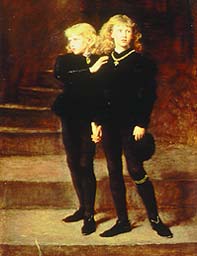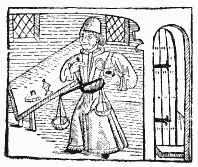
image: http://www.ancientfortresses.org/princes-in-the-tower.htm
Henry VI was troubled all his life by recurring bouts of madness, during which the country was ruled by regents. The regents didn't do any better for England than Henry did, and the long Hundred Years War with France sputtered to an end with England losing all her possessions in France except for Calais. In England itself anarchy reigned. Nobles gathered their own private armies and fought for local supremacy.
The Wars of The RosesThe struggle to rule on behalf of an unfit king was one of the surface reasons for the outbreak of thirty years of warfare that we now call the Wars of the Roses, fought between the Houses of York (white rose) and Lancaster (red rose). In reality these squabbles were an indication of the lawlessness that ran rampant in the land. More squalid than romantic, the Wars of the Roses decimated both houses in an interminably long, bloody struggle for the throne. The rose symbols that we name the wars after were not in general use during the conflict. The House of Lancaster did not even adopt the red rose as its official symbol until the next century.
Edward IV
Henry VI was eventually forced to abdicate in 1461 and died ten years later in prison, possibly murdered. In his place ruled Edward IV of the house of York who managed to get his dubious claim to the throne legitimized by Parliament. Edward was the first king to address the House of Commons, but his reign is notable mostly for the continuing saga of the wars with the House of Lancaster and unsuccessful wars in France. When Edward died in 1483 his son, Edward V, aged twelve, followed him. In light of his youth Edward's uncle Richard, Duke of Gloucester, acted as regent.
Henry VI was eventually forced to abdicate in 1461 and died ten years later in prison, possibly murdered. In his place ruled Edward IV of the house of York who managed to get his dubious claim to the throne legitimized by Parliament. Edward was the first king to address the House of Commons, but his reign is notable mostly for the continuing saga of the wars with the House of Lancaster and unsuccessful wars in France. When Edward died in 1483 his son, Edward V, aged twelve, followed him. In light of his youth Edward's uncle Richard, Duke of Gloucester, acted as regent.
The Princes in The Tower
Traditional history, written by later Tudor historians seeking to legitimize their masters' past, has painted Richard as the archetypal wicked uncle. The truth may not be so clear cut. Some things are known, or assumed, to be true. Edward and his younger brother were put in the Tower of London, ostensibly for their own protection. Richard had the "Princes in the Tower" declared illegitimate, which may possibly have been true. He then got himself declared king. He may have been in the right, and certainly England needed a strong and able king. But he was undone when the princes disappeared and were rumoured to have been murdered by his orders.
Traditional history, written by later Tudor historians seeking to legitimize their masters' past, has painted Richard as the archetypal wicked uncle. The truth may not be so clear cut. Some things are known, or assumed, to be true. Edward and his younger brother were put in the Tower of London, ostensibly for their own protection. Richard had the "Princes in the Tower" declared illegitimate, which may possibly have been true. He then got himself declared king. He may have been in the right, and certainly England needed a strong and able king. But he was undone when the princes disappeared and were rumoured to have been murdered by his orders.
In the 17th century workmen repairing a stairwell at the Tower found the bones of two boys of about the right ages. Were these the Princes in the Tower, and were they killed by their wicked uncle? We will probably never know. The person with the most to gain by killing the princes was not Richard, however, but Henry, Earl of Richmond. Henry also claimed the throne, seeking "legitimacy" through descent from John of Gaunt and his mistress. See a more in-depth article on the Princes in the Tower here.

A prosperous merchant in 1475
Henry defeated and killed Richard at the Battle of Bosworth Field (1485). The crown is said to have been found hanging upon a bush, and it was placed on Henry's head there on the field of battle. Bosworth marked the end of the Wars of the Roses. There was no one else left to fight. It also marked the end of the feudal period of English history. With the death of Richard III the crown passed from the Plantagenet line to the new House of Tudor, and a new era of history began.
Kings were gaining the upper hand in the struggle with the barons. They encouraged the growth of towns and trade. They took more advisors and officials from the new merchant middle class.
This eroded the power of the land-based nobility. Further, kings established royal courts to replace local feudal courts and replaced feudal duties (which had been difficult to collect in any case) with direct taxation. They created national standing armies instead of relying on feudal obligations of service from vassals. Feudal kingdoms moved slowly towards becoming nations.
No comments:
Post a Comment